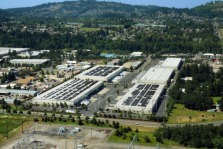
ProLogis, a warehouse and distribution company, is building a 2.4 megawatt solar power project on the roofs of seven warehouses in Portland, Oregon.
This is the second rooftop solar project built by Prologis and Portland General Electric (PGE), the local utility. Together, the two projects will generate 3.5 MW of solar energy.
There's more. ProLogis has solar power projects installed or under construction on 27 other buildings in France, Germany, Japan, Spain and the United States. The installations cover more than 8.1 million square feet (755,000 square meters) of roof space and will produce 13.5 MWs of electricity.
ProLogis says that it has another 450 million square feet (42 million square meters) of roof space available for solar installations on industrial buildings in the United States, Europe and Asia.
So could this be the start of something really big?
That depends as much on regulatory and financial environments as it does on natural environments.
Oregon and the European nations where ProLogis is building solar projects have regulatory and financial frameworks that make these projects possible. For example, the Oregon Renewable Energy Act mandates that the largest utilities in the State must deliver 25 percent of their power from renewable sources by 2025. To meet the mandates, Oregon utilities will require about 1,500 megawatts of renewable energy by 2025.
Oregon also has a feed-in tariff that allows renewable energy to be sold back to the grid. In the ProLogis project, all the generated power will feed directly into PGE's electrical system to serve its customers.
Oregon's incentives for promoting renewable energy include an extensive menu of financial incentives including tax credits, production incentives, and loans for renewable energy, on top of federal incentives.
Oregon's regulatory structure and financial incentives have created new business opportunities for everyone involved in the ProLogis project. PGE formed a joint venture with US Bank to own and operate the system and to secure state and federal solar tax credits to help finance the project. In addition to receiving rent payments, ProLogis established its own Renewable Energy group to procure new business, manage installations and provide development management services.
ProLogis hopes this will turn into an extension of its global distribution and logistics business. "Our program is unique because we have dedicated resources across the globe," says Drew Torbin, vice president of renewable energy for ProLogis. He adds that ProLogis has "the construction management experience and local relationships to get solar installations on the fast-track to completion."
John Howley
Orlando, Florida
This is the second rooftop solar project built by Prologis and Portland General Electric (PGE), the local utility. Together, the two projects will generate 3.5 MW of solar energy.
There's more. ProLogis has solar power projects installed or under construction on 27 other buildings in France, Germany, Japan, Spain and the United States. The installations cover more than 8.1 million square feet (755,000 square meters) of roof space and will produce 13.5 MWs of electricity.
ProLogis says that it has another 450 million square feet (42 million square meters) of roof space available for solar installations on industrial buildings in the United States, Europe and Asia.
So could this be the start of something really big?
That depends as much on regulatory and financial environments as it does on natural environments.
Oregon and the European nations where ProLogis is building solar projects have regulatory and financial frameworks that make these projects possible. For example, the Oregon Renewable Energy Act mandates that the largest utilities in the State must deliver 25 percent of their power from renewable sources by 2025. To meet the mandates, Oregon utilities will require about 1,500 megawatts of renewable energy by 2025.
Oregon also has a feed-in tariff that allows renewable energy to be sold back to the grid. In the ProLogis project, all the generated power will feed directly into PGE's electrical system to serve its customers.
Oregon's incentives for promoting renewable energy include an extensive menu of financial incentives including tax credits, production incentives, and loans for renewable energy, on top of federal incentives.
Oregon's regulatory structure and financial incentives have created new business opportunities for everyone involved in the ProLogis project. PGE formed a joint venture with US Bank to own and operate the system and to secure state and federal solar tax credits to help finance the project. In addition to receiving rent payments, ProLogis established its own Renewable Energy group to procure new business, manage installations and provide development management services.
ProLogis hopes this will turn into an extension of its global distribution and logistics business. "Our program is unique because we have dedicated resources across the globe," says Drew Torbin, vice president of renewable energy for ProLogis. He adds that ProLogis has "the construction management experience and local relationships to get solar installations on the fast-track to completion."
John Howley
Orlando, Florida
 RSS Feed
RSS Feed